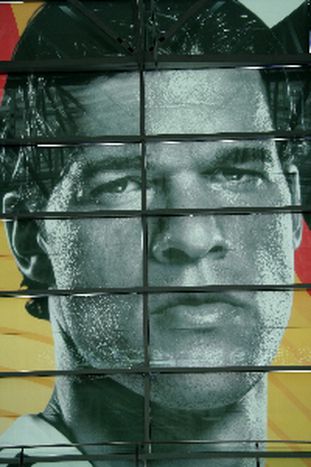
Offside offences
Published on
Translation by:
 katy waterman
katy waterman
They are handsome, rich and famous . . . but the life of a football player is not always an easy one. Psychological stress, flying off the handle and legal disputes are all commonplace
Of sound mind and body? Football stars make magazine headlines and earn millions, but in the words of Makis Chamalidis, a sports psychologist, “striving to perform at your very best is inevitably incompatible with well-being.”
The highs and the lows
You only have to look to the well-known English team Arsenal to see the difficulty some players have in finding their own balance. Born in 1974, Sol Campbell has had some sensational career milestones: he made his first team debut in 1992, was selected for the Euro ’96 tournament, was selected for the England World Cup squad in 1998, won the premiership with Arsenal in 2004 . . .the list goes on. Although he has been selected once again for the 2006 England World Cup squad, the British central defender has had numerous ups and downs to deal with: injuries caused by the rigorous pace to which those at the top of their game are subjected, hostility from both the press and the public following his transfer from Spurs to Arsenal, and the crushing rumours questioning his sexuality have all taken their toll on the player. “Is he good enough to be a champion?” This is currently the most frequently asked question by the British tabloids.
In England, where football rules, the antics of midfielders, defenders and attackers alike are a local tradition. Gazza, otherwise known as Paul Gascoigne, has for many years, given British fans cause for celebration. But the love of alcohol and violent behaviour which have often made the headlines have meant he hasn’t ended his career in England on a high. Wanting to leave bad memories behind, Gascoigne has moved to China to play for the Gansu Tianma team.
Perhaps a worse example is that of Van Persie. In June 2005, the young Dutch player was arrested and jailed for 2 weeks after being accused of rape. Cleared last March by the Dutch authorities, Van Persie was eventually selected for the 2006 Dutch World Cup squad. Another one in the long list of troubled footballers is Sebastien Deisler, a young German hopeful who was all over the papers after signing with 2 different clubs: Bayern Munich and Borussia Dortmund - he is now following a course of treatment for depression.
What’s the price to pay?
So what’s the reason behind these addictions and episodes of flying off the handle and violent behaviour? According to Makis Chamaladis, “pushing yourself constantly to the absolute limit means that you need to find time to recover or to reassess the balance in your life. Some players find solace in family bliss, others lose themselves in an imaginary world created by drugs or mythomania.” This is because performing at your best necessitates a life “centred on moments of excess”, excess “with regard to effort, spending and sometimes addictive behaviour.” Injuries, defeats, financial pressure . . . these are just a few of the many problems facing professional football players as they try to maintain their career. For a few years now, mental coaching has been the fashionable thing to do. According to Makis Chamaladis, the role of a coach is “that of a tutor, a manager and a mentor,” they must remind the players that, above all else, they are human beings with strengths and weaknesses. Whether they win or lose, injured or not . . .
Many football fans tend to dismiss the players’ psychological turmoil by likening their tantrums to those of spoilt children. But these people don’t understand how much the players have had to sacrifice in order to get to the top. The time spent training, from teenage years, takes the place of time spent with family or at school. When it’s time to retire and return to a mundane, routine life with no other professional training other than that of a footballer, things get even more complicated. This is a critical stage of their career: changing profession is the ultimate challenge for a football champion, especially one who didn’t enjoy the same level of success as Zizou or Ronaldinho. There are even those like Maradona who, after their football career and after conquering their drug addiction, become great Spanish TV sports commentators and there are those like Eric Cantona who, despite going to court after behaving violently towards a fan, has bounced back as a comedian and beach soccer promoter in France . . .
But just how many players remain on the scrap heap once their legs are past their best? To avoid this waste of talent, an association was established at the beginning of May this year: the European Former Players’ Association (EFPA). Its aim? To help all ex-professional UEFA footballers to establish a new career and thus guarantee them a standard quality of life so that childhood dreams come true don’t turn into adult nightmares!
Translated from Carton rouge en dehors des terrains


